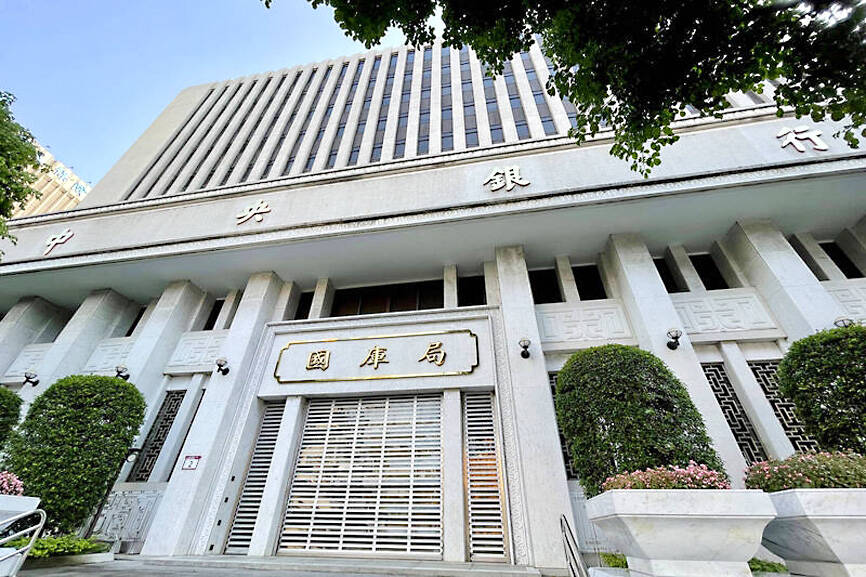The exposure of local banks to the US had dropped 3.08 percent as of the end of September from three months earlier as lenders cut deposits with US reserve banks, the first decline in six quarters, the central bank said yesterday.
The reduction outpaced a 2.55 percent drop in exposure to the other nine regions in the top 10 for Taiwan, with the amount for all 10 totaling US$395.47 billion as of the end of the third quarter, central bank data showed.
Local lenders are flexible about allocating US-dollar capital to leverage favorable interest rate environments and other factors, a central bank official said.

Photo: Clare Cheng, Taipei Times
Local banks had US$152.62 billion in US exposure as of Sept. 30, or 28 percent of the overall overseas risk, the data showed.
With the release of the third-quarter figures, the US has been the nation where local lenders have the most exposure for 33 consecutive quarters, the data showed.
China was next with exposure there falling 0.67 percent to US$46.17 billion from the second quarter, as Taiwanese refrained from investing in Chinese-based funds, the official said.
Risk in China was the lowest since the second quarter of 2020, they said.
Exposure to China is on a long-term decline, which is reflected in other data compiled by the Financial Supervisory Commission, as local lenders are cautious about the weak economy there, they said.
South Korea for the first time squeezed into the top 10 last quarter, outranking Singapore by a small margin, the official said.
Exposure in South Korea fell 1.03 percent to US$15.62 billion, with a 4.14 percent drop, or US$15.47 billion less, in Singapore the primary factor, they said.
Exposure to Hong Kong sank the most among the top 10, falling 8.24 percent to US$2.80 billion, the data showed.
A strong US dollar was also a factor behind reductions in local banks’ exposure to Japan and the UK of 2.14 percent and 3.19 percent respectively, the central bank said.
The yen and pound depreciated 3 percent and 3.87 percent respectively against the greenback in the third quarter, it said.
Australia was the only one of the top 10 to buck the downtrend, gaining 1.44 percent, the data showed.

Taiwan Semiconductor Manufacturing Co (TSMC, 台積電) would not produce its most advanced technologies in the US next year, Minister of Economic Affairs J.W. Kuo (郭智輝) said yesterday. Kuo made the comment during an appearance at the legislature, hours after the chipmaker announced that it would invest an additional US$100 billion to expand its manufacturing operations in the US. Asked by Taiwan People’s Party Legislator-at-large Chang Chi-kai (張啟楷) if TSMC would allow its most advanced technologies, the yet-to-be-released 2-nanometer and 1.6-nanometer processes, to go to the US in the near term, Kuo denied it. TSMC recently opened its first US factory, which produces 4-nanometer

PROTECTION: The investigation, which takes aim at exporters such as Canada, Germany and Brazil, came days after Trump unveiled tariff hikes on steel and aluminum products US President Donald Trump on Saturday ordered a probe into potential tariffs on lumber imports — a move threatening to stoke trade tensions — while also pushing for a domestic supply boost. Trump signed an executive order instructing US Secretary of Commerce Howard Lutnick to begin an investigation “to determine the effects on the national security of imports of timber, lumber and their derivative products.” The study might result in new tariffs being imposed, which would pile on top of existing levies. The investigation takes aim at exporters like Canada, Germany and Brazil, with White House officials earlier accusing these economies of

Teleperformance SE, the largest call-center operator in the world, is rolling out an artificial intelligence (AI) system that softens English-speaking Indian workers’ accents in real time in a move the company claims would make them more understandable. The technology, called accent translation, coupled with background noise cancelation, is being deployed in call centers in India, where workers provide customer support to some of Teleperformance’s international clients. The company provides outsourced customer support and content moderation to global companies including Apple Inc, ByteDance Ltd’s (字節跳動) TikTok and Samsung Electronics Co Ltd. “When you have an Indian agent on the line, sometimes it’s hard

PROBE CONTINUES: Those accused falsely represented that the chips would not be transferred to a person other than the authorized end users, court papers said Singapore charged three men with fraud in a case local media have linked to the movement of Nvidia’s advanced chips from the city-state to Chinese artificial intelligence (AI) firm DeepSeek (深度求索). The US is investigating if DeepSeek, the Chinese company whose AI model’s performance rocked the tech world in January, has been using US chips that are not allowed to be shipped to China, Reuters reported earlier. The Singapore case is part of a broader police investigation of 22 individuals and companies suspected of false representation, amid concerns that organized AI chip smuggling to China has been tracked out of nations such